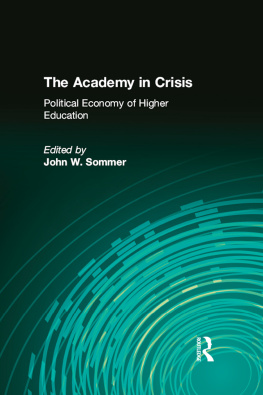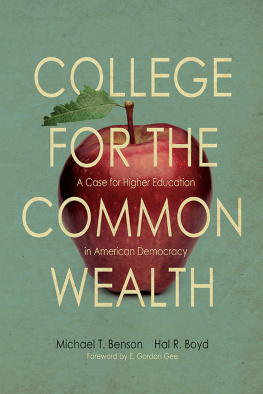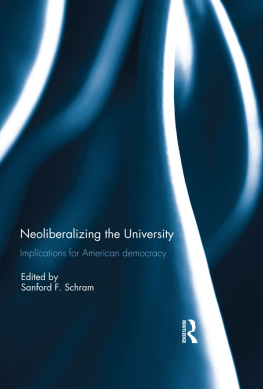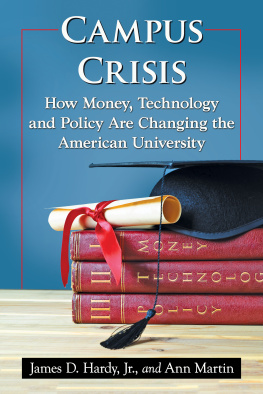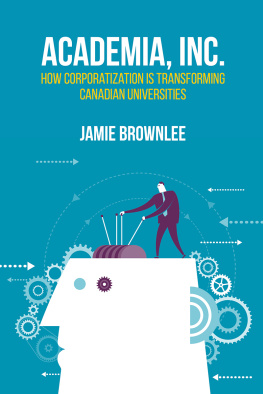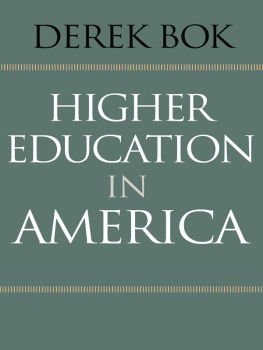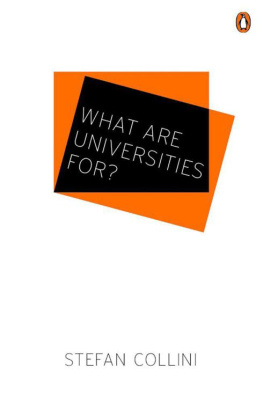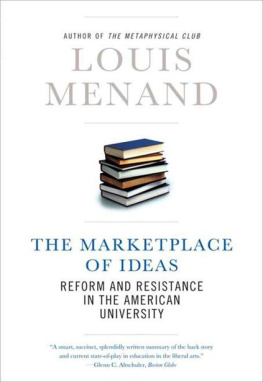Contents
Page List

THE ACADEMY IN CRISIS
THE ACADEMY IN CRISIS
The Political Economy of Higher Education
Edited by
John W. Sommer
With an Introduction by
Nathan Glazer

First published 1995 by Transaction Publishers
Published 2017 by Routledge
2 Park Square, Milton Park, Abingdon, Oxon 0X14 4RN
711 Third Avenue, New York, NY 10017, USA
Routledge is an imprint of the Taylor & Francis Group, an informa business
Copyright 1995 by The Independent Institute, Oakland, California.
All rights reserved. No part of this book may be reprinted or reproduced or utilised in any form or by any electronic, mechanical, or other means, now known or hereafter invented, including photocopying and recording, or in any information storage or retrieval system, without permission in writing from the publishers.
Notice:
Product or corporate names may be trademarks or registered trademarks, and are used only for identification and explanation without intent to infringe.
Library of Congress Catalog Number: 94-9271
Library of Congress Cataloging-in-Publication Data
The Academy in Crisis : the political economy of higher education / edited by John W. Sommer ; foreword by Nathan Glazer.
p. cm.
Includes bibliographical references and index.
Contents: Higher education / John W. SommerThe evolution of American higher education / Roger MeinersIn service to the state / Joel Spring-Federal student aid and institutional support programs / C. Ronald KimberlingHigher education, the individual, and the humane sciences / Antony FlewThe economics of higher education / E.G. WestEconomics of fundamental research / Stephen DreschProperty rights in academe / Roger MeinersNormative and positive models of scientific research / Peter AransonScience and technology for economic ends / Joseph Martino Universities and training of scientists / Cotton M. Lindsay.
ISBN 1-56000-182-8
1. Higher education and stateUnited States. 2. Federal aid to higher educationUnited States. 3. University autonomyUnited States. 4. Federal aid to researchUnited States. 5. Education, HigherEconomic aspectsUnited States. I. Sommer, John W., 1938- . II. Glazer, Nathan.
LC173.A48 1994
379.0973dc20
94-9271
CIP
ISBN 13: 978-1-56000-801-9 (pbk)
Disclaimer
The publisher has made every effort to trace copyright holders and welcomes correspondence from those they have been unable to contact.
Contents
Nathan Glazer
Introduction
American Higher Education: State of the Art or Art of the State?
John W. Sommer
I. The Politicization of Higher Learning
Introduction to Part I
Roger E. Meiners
Joel H. Spring
C. Ronald Kimberling
Antony Flew
II. The Political Economy of Higher Learning
Introduction to Part II
Edwin G. West
Stephen P. Dresch
Roger E. Meiners and Robert J. Staaf
III. The Political Economy of Scientific Research
Introduction to Part III
Peter H. Aranson
Joseph P. Martino
Cotton M. Lindsay
The structure of American higher education is unique. While higher education in the great European nations is almost entirely in the hands of government, with either a nonexistent private sector or one limited to a few Catholic institutions or business schools, half the institutions of higher education in the United States are private and one-fifth of our students attend private institutions. In addition, our most distinguished research universities and our most selective colleges are in large part private. The only nations that, in some degree, approach our system of higher education are those that have fallen (in large measure and at key points in their development) under American influence: Japan, Korea, and the Philippines. But even in these nations, the most distinguished and prestigious institutions are public, not private.
Is it owing to this distinctive role of the private sector that American higher education remains one of the few areas of American life in which American predominance and advantage are so marked? Many might think so: Henry Rosovsky, the former dean of the Faculty of Arts and Sciences of Harvard University, has often pointed to this predominance of American institutions among the leading universities of the world. And it stands to reason that the remarkable flow of private fundsindividual, corporate, and foundationto American colleges and universities can be attributed to a direct link between these institutions and students, communities, and donors.
But, while it is still meaningful to make use of the public-private dichotomy in American higher education, in increasing measure all institutions of higher education are dependent upon public support, state or federal. In even greater measure, all institutions of higher education fall under some degree of public control and regulation, a degree that grew alarmingly during the 1970s, a decade in which public support, particularly in the form of student loans and grants, grew enormously.
The consequences to American higher education is the central theme of The Academy in Crisis. The findings of this excellent book are in favor of the private sector, in favor of an institutional pattern that links those who seek advantage in their personal lives and economic opportunities directly with the institutions that provide it. In this way the process is left as much as possible to the workings of a market of free choice and free provision, in which the effect of competition, of choice among alternatives, is unimpeded. It is safe to infer that most of the contributors to this book come to the conclusion that institutions should be as free of government control as possible, even though the writers take a variety of positions on the question of just how government control and support adversely affects institutions of higher education.
This is a markedly minority but increasingly influential view in American higher education. The leaders of American higher education, public and private, university and college, are as eager for as much government support as they can getfor student tuition, for research, for the maintenance of libraries, for the building of dormitories, and indeed for whatever other function regarding which they may be able to justify public support. However, these same administrators are agitated by the degree of public control that comes with these funds. They are concerned by the cost of implementing regulations for women, for minorities, for the handicapped, and so on. Such regulations have increasingly established their legitimacy quite independently of the fact that government may provide funds to these institutions.
In recent years, we have also seen a surprising amount of governmental intervention into the conduct of research, which has been very alarming to scientists, the chief beneficiaries of the cornucopia of government grants. Universities have lost their claim to a superior level of morality, despite the fact that they are nonprofit institutions: they are now viewed as suspiciously by some congressmen and by parts of the mass media as are private firms working on government arms contracts, and these watchdogs leap to the charges of whistle-blowers in universities as eagerly as they do to the charges of those who expose screw-drivers that cost $600 apiece or unimaginably expensive toilet seats.

